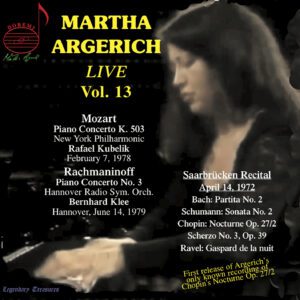With one exception, none of the repertoire offered in Doremi’s 13th volume in its Martha Argerich Live series is new to the iconic pianist’s discography. Yet these previously unpublished performances are anything but redundant.
A 1978 Mozart C major K. 503 concerto with Rafael Kubelik leading the New York Philharmonic finds Argerich in far more incisive, energetic, colorful, and spontaneous fettle than in her later, relatively small-scaled DG recording under Claudio Abbado. It’s similar to her collaboration with Szymon Goldberg and the Netherlands Chamber Orchestra (Warner Classics), but with better orchestral support. As always, Argerich plays Friedrich Gulda’s first-movement cadenza, which the pianist tears into here with the energy of an unbridled puppy, in contrast to her mellower DG remake.
A live Rachmaninov Piano Concerto No. 3 from June 14, 1979 with Bernhard Klee conducting the Hannover Radio Symphony Orchestra provides a more volatile and electrifying alternative to Argerich’s long available and justly celebrated 1982 live recording with Riccardo Chailly. Cases in point: her daredevil pace for the first-movement cadenza, plus the second movement’s stinging accents and restless inner voices. True, Klee sometimes struggles to keep up with his soloist’s quicksilver audacity throughout the third movement, but let’s face it, the pianist is the star.
Subtle interpretive differences distinguish Argerich’s April 14, 1972 Saarbrucken Recital readings from their DG studio counterparts. In the opening Bach Partita No. 2, for example, the pianist’s Corrente is more lyrically inflected and relaxed, while the Capriccio is less emphatic and driven. Similarly, Argerich loosens her demonic grip on the Schumann Sonata No. 2 outer movements and the Chopin Scherzo No. 3 in exchange for moments of poetic respite, all to the music’s good.
Poetry and eloquence abound in the pianist’s gorgeously phrased Chopin Nocturne in D-flat Op. 27 No. 2, a welcome addition to her recorded repertoire. As for the Ravel there’s little to choose between Saarbrucken and DG; Argerich’s playful demeanor and astonishingly supple fingers raised Gaspard de la nuit’s interpretive bar and international speed limit tenfold.
The source material for this release appears to originate from excellent quality air checks, with announcements intact. What’s not to love about vintage Martha Argerich on her impetuous top form? Go for it, piano fans!
































